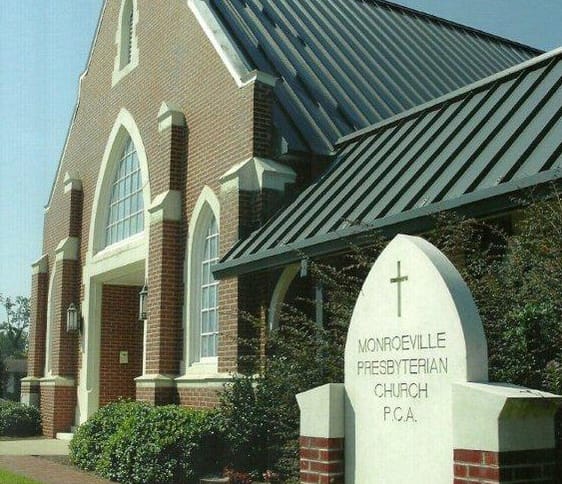Dear MPC family,
Have you ever heard the term “Fencing the Table?” This is a practice that occurs (or should occur) every time we partake of the Lord’s Supper. Fencing the Table is the responsible action of ordained ministers of the Word where, prior to the Lord’s Supper, we clearly define the boundaries of who might rightly partake of the sacrament according to Biblical teaching.
So, why is fencing so important? Please understand that the reason for our fencing the table is not because we are elitist or mean. Rather, the reason we do it is out of compassion and obedience. The Lord is deadly serious about people partaking of his body and blood in a worthy manner. How serious? Well, the church in Corinth had members who partook of the Supper in an unworthy manner. Doing so, they ate and drank judgment upon themselves (1 Cor. 11:27-29). Soon after their violation, the Lord punished them with death (1 Cor. 11:30).
Hence, Fencing the Table is a requirement in PCA churches. The PCA Book of Church Order(BCO), 58-4 states:
Since, by our Lord’s appointment, this Sacrament sets forth the Communion of Saints, the minister, at the discretion of the Session, before the observance begins, may either invite all those who profess the true religion, and are communicants in good standing in any evangelical church, to participate in the ordinance; or may invite those who have been approved by the Session, after having given indication of their desire to participate.
You will notice the BCO gives latitude for two practices of fencing. First, it permits “‘open communion,’ that is, allowing members in good standing of any evangelical church to partake.”[i]It also permits “‘close communion,’ which permits only those members of other churches who have been examined and approved by the Session to partake.”[ii]At MPC we generally practice the first option of “open communion” and reserve the second option of “close communion.”
Stated plainly, the Lord’s Supper is for baptized disciples of Christ (those who “profess the true religion”), whom the BCO refers to as “communicants in good standing of any evangelical church.” To be a communicant in a church is to be a member, and to be a member of an evangelical church typically requires members to have been baptized. If a disciple of Christ has not yet been baptized, he or she needs to be baptized “with all proper speed, and thereupon admitted to the table. At this point, these communicants are baptized members of a visible church.”[iii]Such is the Biblical order. Baptism is the initiatory sacrament into the covenant community of God, replacing circumcision from the OT. Within that community, disciples of Christ (fellow believers) celebrate the Lord’s Supper together (cf. BCO 57-3 & 57-4).[iv]
Now, to be a communicant “in good standing” is to be not under church censure. For example, if a person has been excommunicated from a church for unrepented sin, then that person has been barred from the table not only in that church, but any church where Christ is Lord and the true religion is proclaimed and practiced.
The Westminster Larger Catechism, question 173 (also see BCO 58-2), helps to further clarify by asking, “May any who profess the faith, and desire to come to the Lord’s supper, be kept from it?” The answer:
Such as are found to be ignorant or scandalous, notwithstanding their profession of the faith, and desire to come to the Lord’ s supper, may and ought to be kept from that sacrament, by the power which Christ hath left in his church, (1 Cor. 11:27–31, Matt. 7:6, 1 Cor. 5, Jude 23, 1 Tim. 5:22) until they receive instruction, and manifest their reformation.
Here, two are identified that are to be kept from the sacrament. First, the “ignorant.” This statement includes children. Children (like everyone else), whether baptized as infants or not, are not permitted to partake of the Lord’s Supper until they have been examined and admitted to the supper by the session. The reason is that it is necessary that a person “examine themselves” and “recognize the body and blood of the Lord” (1 Cor. 11:28-29), in order to partake. Hence, the PCA does not practice “paedocommunion.” Now, when a child or adult is able to meet these requirements and provide a credible confession of faith to the session, the session may then approve their partaking. At MPC, the normal route for children to be admitted to the table is to go through a communicants class where formal instruction is given. Upon their completion of the class and the session’s approval, the graduates are baptized, if they are not already, and become members of the church.
Second, one who is “scandalous” would be one who is involved in unrepented sinful acts or involved in sins that have publicly affected the reputation of the church, marring the Lord’s name. This includes those who participate in such or comparable behavior that Paul speaks to in 1 Cor. 11:18-21 (see also 1 Cor. 5). Examining oneself prior to the Lord’s Supper provides the opportunity to repent such sins. If such a person then repents, the Lord’s Supper is then back on the table. If the Supper has actively been kept from the individual, the session must be made aware of the repentance for the sinful scandalous behavior so that orderly proceedings to restore the brother or sister to being a communing member may take place.
My hope is that this has helped your understanding a bit concerning who may partake of the Lord’s Supper. If you have any questions, please feel free to ask me or another elder.
In Christ,
Roger
[i]PCA Digest: Position Papers, 1973-1993, pt. V. (Atlanta, Presbyterian Church in America, 2003), 298.
[ii]Ibid.
[iii]Ibid., 299.
[iv]The Orthodox Presbyterian Church (OPC), in harmony with the PCA’s position, provides a summary of the biblical support for the requirement of baptism before admittance to the table on their website: https://www.opc.org/qa.html?question_id=500.


